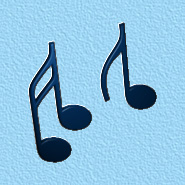
Howdy, and welcome to this month's article. I'd like to wish everyone a very happy leap year, even if it doesn't mean much for you. I myself am very happy that this year was a leap year; it gave me an extra day, which is a good thing. I can't get more hours in a day, but at least I can an extra day this month. Pretty neat, hunh? Be careful what you wish for....
I'd also like to tell you about a new section of this area (column, whatever you wanna call it) I've been doing my homework (aside from the homework I *really* have to do..) and starting in April...will hopeful have some indie, or unsigned bands to review. It should be pretty neato..
So, here we are at the beginning of my article...y'all are probably wondering (now that I've gotten the nonsense out of the way) what the heck the title means. Well...as it goes, I was in the shower (yes, it's true-a frequent occurrence) and I was thinking of the music that I've written, and how unique to the world it was. It occurred to me that it really wasn't very unique, and just barely original. Then I took my own defense, and asked myself just how true that was for a lot of the popular music that's out now.
I came to the conclusion that most popular music of the 20th century wasn't very original, theoretically speaking, at all. I, IV and V (the tonic, subdominant, and dominant chords in a key) chords have been used (in that order, and others) for over 300 years. In fact, from roughly 1600 to 1900 is considered the "Common Practice Period" in music, where those types of harmonies were used consistently throughout that time period. At the turn of the century, composers were getting pretty sick of I,IV, and V chords. They needed a new identity to give them a new voice that could change with the times, so they turned to chromatics, and atonal sounds. Common practice harmony, didn't disappear, though..it just moved into more secular mediums, like blues, jazz, and folk...the so called "popular" music of the 20th century.
Of course, atonality, and chromatics weren't exactly new. Wagner had used plenty of both (mostly chromatics) in his operas nearly 40 years before, but even before Wagner, there was Bach, and an Italian aristocrat by the name of Gesualdo.
So you see, much of music is not totally new. Rather, it's more like it's cyclical. Think of the top 40 "alternative" bands of today...aren't they rehashing a lot of what was done in the 70's by the punk movement?
But then that was just it. It had occurred to me that music may have been done before...and sounded similar, but that's not all it was. An artist uses what he knows to paint a picture. Of course, a painter who uses oil paint on a canvas to paint a sunset isn't doing anything new. But, take a look at the difference between a sunset that was painted by, say a Renaissance painter, and one today. What's the difference?
The difference is that the modern painter may be using the same medium, but he has a host of other influences that have come before him. Abstract painters, like Piccaso, VanGogh, and Dali. Surrealism, Dadaism...the list goes on. The 16th century Flemish painter didn't have any of those influences, at all. There was no way he could of drawn on these models in order to express himself. If someone tried to paint like that today, they might be considered "dated". And there it is again....you can tell that something comes from a certain time period (by means other than seeing that it's really old) because it has it's own individual look, or sound, or feel. A car from the 50's doesn't look like one from the 90's...
That is what made me see that every age has it's own voice. That is to say, every period, artistically, and otherwise has it's own identity. Why do we consider recent past history in terms of decades? Isn't it because we see each of them having their own particular styles, tastes, colors, flavors, thoughts, feelings, etc.? The same goes for music, as it does for style. Bellbottoms may be in vogue again, but they have a decidedly 90's look to them. "Retro" may be in, but only as it looks through the eyes of now. That's exactly what's happening (excuse the pun, if you get it..). Our artists, our composers, our writers are drawing on all their experiences to put together their own conglomeration to give this decade it's own voice.
So while my music may sound like something that's come before...you wouldn't hear it in the 70's...you wouldn't have heard in the 80's....but in the 90's...it has a definite home.
Pax perem musicum.
Ok y'all...this is your chance, tell it like it is...you have a band you're just dying to tell everyone about? (if it's your own, that's ok too). You just heard an album by someone new, or someone dead that's driving you bonkers every hour that you play it? Tell us!! We want to know!! This is a place to share good stuff that you think others might just enjoy. No negative reviews, please...we don't do that here. You think someone sucks? Tell them to their face, and see how well everyone takes constructive criticism...Oh..by the way...tell us when and where a band/solo artist/ensemble is performing, or where we can find the album/single/soundbyte, some of us just might want to check it out. Also, if anyone has music they want to share via the Net, send it here...we'll give it a listen...but we make no promises..
I want to send in my ideas to the Music Clinic!
I want to send you my Music Reviews! I know that all responses will be considered, and those selected for the article will be duly credited to the author.